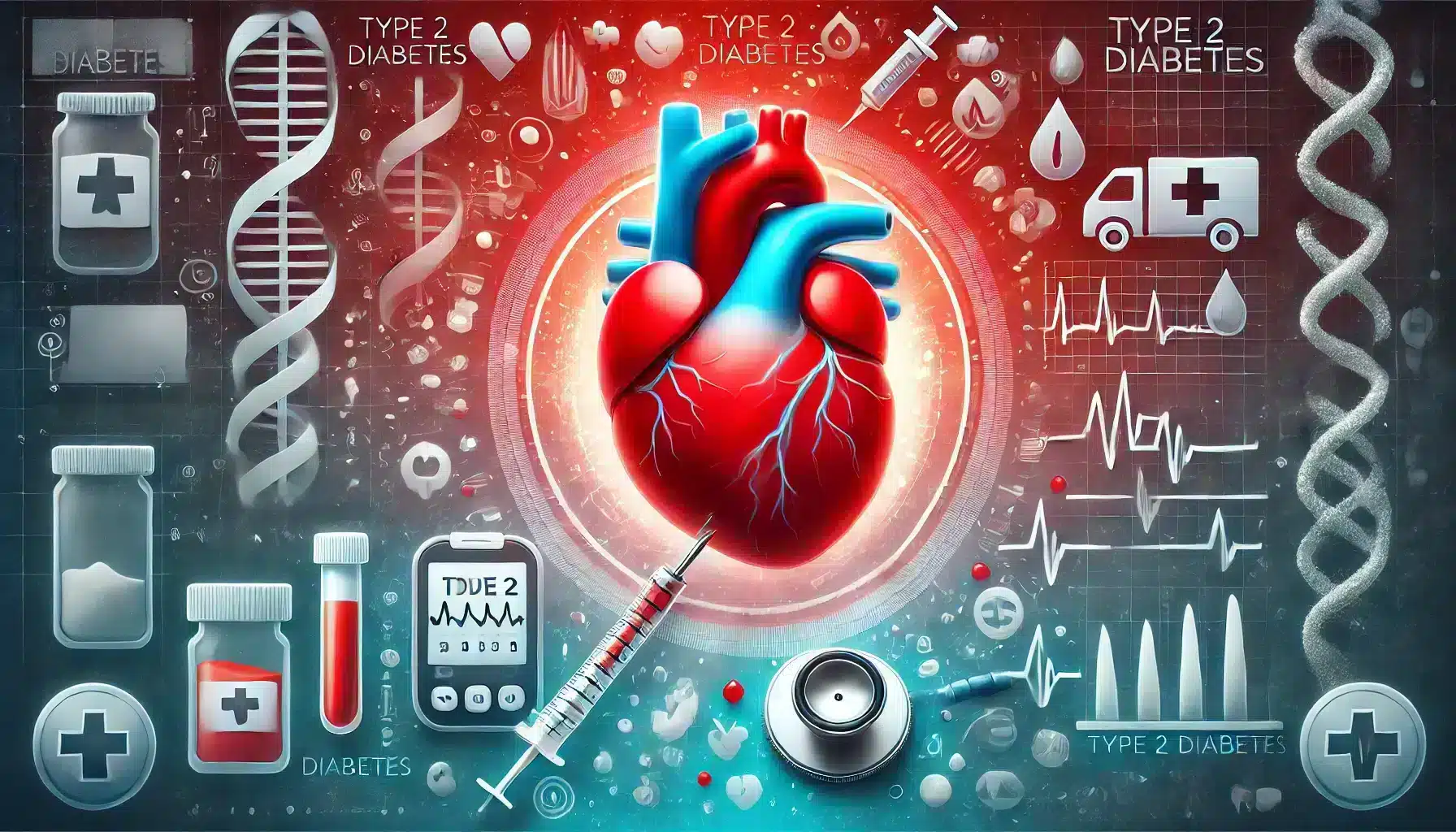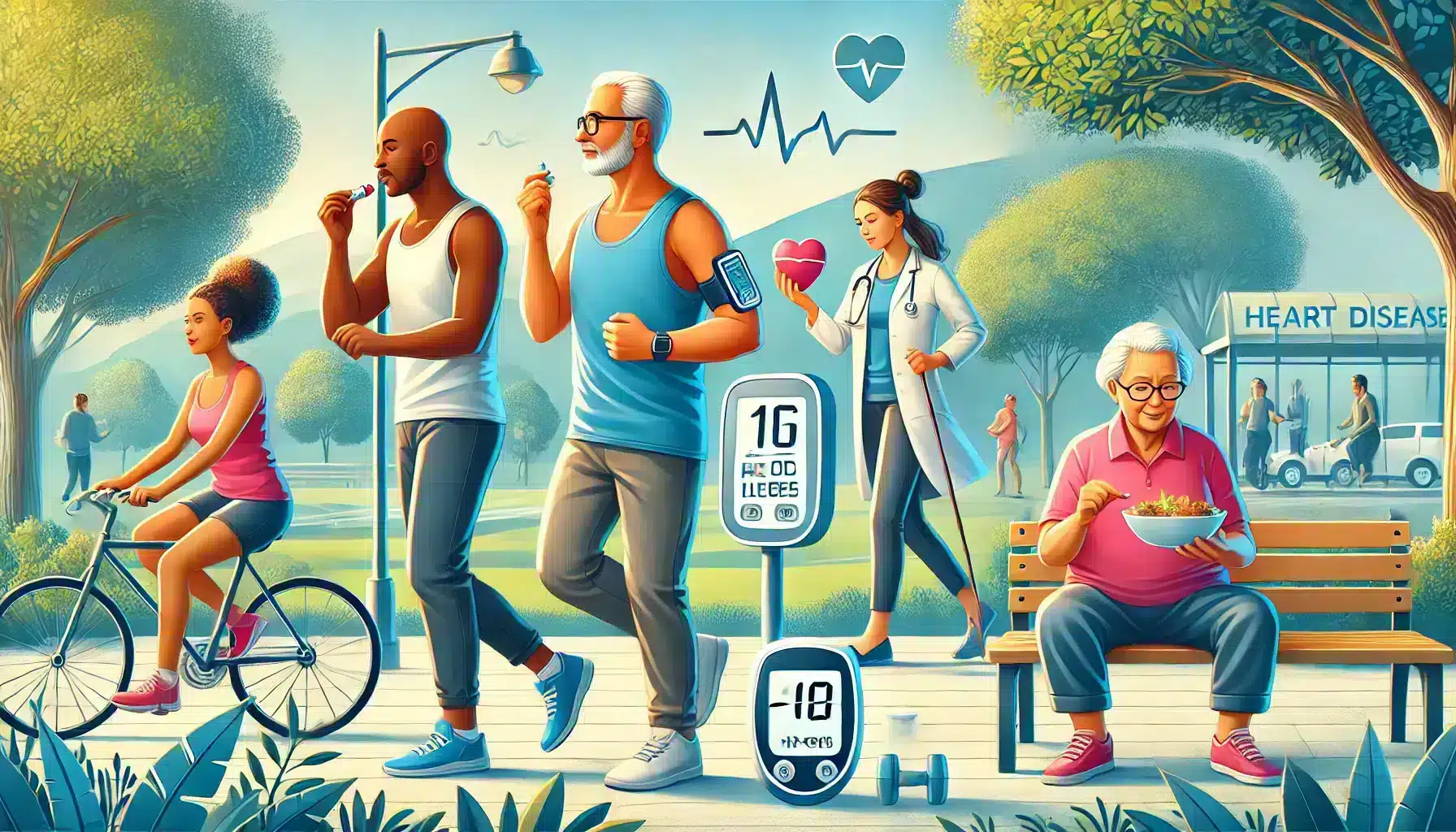Understanding the Connection Between Type 2 Diabetes and Heart Disease
Type 2 diabetes is a chronic condition that significantly impacts heart health. This type 2 diabetes and heart disease risk is one of the most serious complications diabetics face. But how exactly does diabetes lead to heart disease? It’s essential to understand the mechanisms through which high blood sugar levels influence the cardiovascular system.

Diabetes causes damage to blood vessels and nerves that control the heart. Over time, consistently high blood glucose levels can lead to conditions like atherosclerosis—the buildup of fats, cholesterol, and other substances in and on the artery walls (plaques), which can restrict blood flow. Additionally, individuals with type 2 diabetes are more prone to high blood pressure, another risk factor for cardiovascular diseases.
- High blood sugar levels over time can damage blood vessels, leading to heart disease.
- Type 2 diabetes patients are more likely to develop conditions such as atherosclerosis.
- Increased risk of high blood pressure is another direct connection between diabetes and heart disease.
Understanding this connection is the first step in preventing complications. When heart health is compromised by diabetes, managing both blood sugar and cardiovascular risk factors is crucial for long-term health.
Risk Factors of Heart Disease in Type 2 Diabetes Patients
For individuals with type 2 diabetes, the risk of developing heart disease is higher due to a combination of factors. These factors, when not properly managed, can significantly increase the likelihood of heart-related complications. It’s important to address these risk factors as early as possible to reduce the overall heart disease risk.

Let’s explore the key contributors that link type 2 diabetes to heart disease:
High Blood Pressure and Cholesterol
One of the most common risk factors for heart disease in type 2 diabetes patients is high blood pressure. Diabetes and high blood pressure often coexist, leading to additional strain on the heart and arteries. Elevated blood pressure damages the arteries, making them more susceptible to blockages, and increases the overall risk of heart attacks and strokes.
In addition, many type 2 diabetes patients have abnormal cholesterol levels. Specifically, they tend to have lower levels of “good” HDL cholesterol and higher levels of “bad” LDL cholesterol, which contributes to plaque buildup in the arteries. This combination of high blood pressure and unhealthy cholesterol levels significantly elevates the risk of heart disease.
- High blood pressure exacerbates the cardiovascular risks already present in diabetes.
- Abnormal cholesterol levels, particularly high LDL and low HDL, accelerate plaque buildup.
Insulin Resistance and Obesity
Insulin resistance is another key factor connecting type 2 diabetes and heart disease. Insulin resistance occurs when the body’s cells do not respond properly to insulin, leading to elevated blood sugar levels. This condition is closely tied to obesity, which is a common problem among people with type 2 diabetes.
Obesity contributes to a variety of heart-related issues, including increased blood pressure, higher cholesterol levels, and greater risk of inflammation, all of which increase the likelihood of developing cardiovascular diseases. Insulin resistance, combined with obesity, significantly raises the heart disease risk in diabetes patients.
- Insulin resistance leads to elevated blood sugar and is closely linked to heart disease risk.
- Obesity in diabetes patients exacerbates the risk factors for cardiovascular conditions.
Early Signs of Heart Disease in Diabetic Patients
Identifying the early signs of heart disease is crucial for individuals with type 2 diabetes. Early detection can lead to timely interventions that may prevent severe cardiovascular events, such as heart attacks or strokes. Many of the early warning signs can be subtle, so it’s essential for diabetic patients to pay close attention to any changes in their body, particularly those related to heart health.

The following symptoms are key indicators of potential heart problems in individuals with type 2 diabetes:
Shortness of Breath
One of the most common early signs of heart disease is shortness of breath. This occurs when the heart is no longer able to efficiently pump blood throughout the body. For people with type 2 diabetes, this may be an early indicator of heart failure or coronary artery disease. Shortness of breath can occur during physical activity, but it may also happen when a person is at rest, especially in more advanced stages.
It’s important to recognize that shortness of breath in diabetic patients should not be dismissed as a normal part of aging or a side effect of diabetes. If this symptom persists or worsens, it’s essential to seek medical advice.
Chest Pain
Chest pain is another significant warning sign of heart disease. In individuals with type 2 diabetes, chest pain may occur due to the narrowing or blockage of arteries, a condition known as angina. Diabetic patients are at higher risk of developing coronary artery disease, which often manifests as chest pain or discomfort, especially during physical exertion.
Chest pain in diabetic individuals may feel like pressure, tightness, or squeezing in the chest area. It’s important not to ignore these symptoms, as they can be precursors to a heart attack. Diabetic patients experiencing chest pain should immediately consult their healthcare provider to rule out serious heart conditions.
- Shortness of breath during activity or rest is a key indicator of potential heart disease.
- Chest pain or discomfort, often associated with coronary artery disease, should be treated as an urgent medical concern.
Preventive Measures for Reducing Heart Disease Risk in Type 2 Diabetes Patients
While the link between type 2 diabetes and heart disease is well established, there are several preventive measures that diabetic patients can adopt to reduce their risk. These strategies focus on managing blood sugar levels, improving overall heart health, and addressing key risk factors like high blood pressure, cholesterol, and obesity. A proactive approach can significantly lower the chances of developing heart-related complications.

Diet and Lifestyle Modifications
A heart-healthy diet is one of the most effective ways to lower the heart disease risk in individuals with type 2 diabetes. This includes consuming foods that are low in saturated fats, trans fats, cholesterol, and sodium. Incorporating plenty of fruits, vegetables, whole grains, lean proteins, and healthy fats (such as those found in olive oil and nuts) can help manage blood sugar levels and improve cardiovascular health.
In addition to dietary changes, regular physical activity is essential. Exercise helps control blood sugar, reduce insulin resistance, and improve heart function. Diabetic patients should aim for at least 150 minutes of moderate-intensity exercise per week, such as walking, swimming, or cycling.
- Adopting a heart-healthy diet rich in fruits, vegetables, and whole grains can reduce heart disease risk.
- Regular physical activity improves insulin sensitivity and promotes better cardiovascular health.
Regular Monitoring of Blood Sugar and Heart Health
Maintaining optimal blood sugar levels is key to reducing the risk of heart disease in type 2 diabetes patients. Regular blood sugar monitoring helps identify any fluctuations that could lead to complications. In addition to managing blood glucose, diabetic patients should regularly check their blood pressure and cholesterol levels, as these are important indicators of heart health.
For comprehensive heart disease prevention, patients should also undergo routine heart screenings. Tests like electrocardiograms (ECG) or stress tests can detect early signs of cardiovascular problems, allowing for early intervention.
- Regular blood sugar monitoring is essential for preventing diabetes-related heart complications.
- Routine heart health check-ups can help detect problems early and prevent serious outcomes.
Latest Research and Treatments for Diabetes-Related Heart Disease
As the connection between type 2 diabetes and heart disease becomes more well understood, ongoing research continues to explore new treatment methods and strategies to mitigate heart disease risk in diabetic patients. Advances in both medication and treatment protocols offer hope for better management of both conditions.

In recent years, breakthroughs in understanding the relationship between diabetes and cardiovascular health have led to the development of innovative treatments that can slow or even reverse the progression of heart disease. These treatments focus on controlling both blood sugar levels and addressing underlying heart-related risk factors such as hypertension and high cholesterol.
Clinical Trials and New Medications
Many promising clinical trials are underway to test new medications that can improve heart health in people with type 2 diabetes. One area of focus is the development of drugs that can simultaneously lower blood sugar levels and reduce the risk of cardiovascular events. Some newer classes of diabetes medications, such as SGLT2 inhibitors and GLP-1 receptor agonists, have shown significant heart-protective benefits in clinical trials.
For example, drugs like empagliflozin and liraglutide have been found to reduce the risk of major cardiovascular events, including heart attack and stroke, in patients with type 2 diabetes. These medications work by improving blood sugar control and providing direct benefits to heart health, making them an important part of diabetes management for high-risk patients.
- New medications, including SGLT2 inhibitors and GLP-1 receptor agonists, offer both blood sugar control and heart protection.
- Clinical trials show significant reductions in cardiovascular events among diabetes patients using these medications.
Innovative Treatments
In addition to medication, there are also innovative treatment approaches aimed at reducing heart disease risk in type 2 diabetes patients. These include advanced interventions like bariatric surgery for severely obese patients, which has been shown to improve both diabetes control and heart health.
Other promising treatments include the use of medical devices, such as implantable cardioverter-defibrillators (ICDs) and pacemakers, which can help regulate heart function in patients with severe cardiovascular complications. Additionally, new technologies like continuous glucose monitors (CGMs) and wearable heart rate monitors allow patients to closely track both blood sugar levels and heart health metrics, enabling more personalized care.
- Bariatric surgery offers significant improvements in both diabetes management and heart disease risk.
- Innovative technologies, such as CGMs and heart monitors, provide real-time data for better disease management.
Conclusion
The connection between type 2 diabetes and heart disease is undeniable, but understanding the risk factors and early signs can empower patients to take control of their health. By adopting preventive measures such as dietary changes, regular exercise, and consistent monitoring of blood sugar and heart health, individuals with type 2 diabetes can significantly reduce their heart disease risk.
Thanks to ongoing research and the development of new treatments, the future looks promising for diabetes patients facing the threat of heart disease. With the right approach, it’s possible to manage both conditions effectively and lead a healthier, longer life.
- Prevention through lifestyle changes remains the most effective strategy for reducing heart disease risk.
- New treatments and ongoing research offer hope for improving heart health in diabetic patients.
FAQ
What is the connection between type 2 diabetes and heart disease?
Type 2 diabetes can damage blood vessels and nerves that control the heart. It also increases the risk of conditions such as high blood pressure and high cholesterol, which are major contributors to heart disease.
Can lifestyle changes reduce the risk of heart disease in diabetic patients?
Yes, adopting a heart-healthy diet, regular exercise, and managing blood sugar levels can significantly reduce the risk of heart disease in people with type 2 diabetes.
What are the latest treatments for heart disease in diabetic patients?
New medications like SGLT2 inhibitors and GLP-1 receptor agonists have shown heart-protective benefits. Additionally, innovative treatments like bariatric surgery and advanced medical devices are available for managing severe cases.
How can I detect early signs of heart disease as a diabetic?
Common early signs include shortness of breath, chest pain, and fatigue. If you experience any of these symptoms, especially during physical activity, you should consult your doctor immediately.
Why does type 2 diabetes increase the risk of heart disease?
Type 2 diabetes can cause damage to blood vessels, lead to high blood pressure and cholesterol, and increase insulin resistance. These factors collectively raise the risk of heart disease.
Is heart disease preventable in people with type 2 diabetes?
While having type 2 diabetes increases heart disease risk, it is possible to reduce that risk through proper management of blood sugar levels, regular exercise, and maintaining a healthy diet.
How often should diabetic patients monitor their heart health?
Diabetic patients should regularly check their blood pressure, cholesterol levels, and undergo heart screenings like electrocardiograms (ECGs) or stress tests, especially if they have additional risk factors.
Are there specific diets recommended for reducing heart disease risk in diabetics?
A heart-healthy diet rich in whole grains, fruits, vegetables, lean proteins, and healthy fats, while limiting processed foods, sugar, and trans fats, is highly recommended for reducing heart disease risk.
What role does exercise play in managing diabetes-related heart disease risk?
Regular physical activity helps control blood sugar, reduces insulin resistance, improves heart health, and lowers blood pressure and cholesterol, all of which can help reduce heart disease risk in diabetic patients.
Can type 2 diabetes medications help reduce heart disease risk?
Yes, certain diabetes medications, such as SGLT2 inhibitors and GLP-1 receptor agonists, have been shown to offer cardiovascular protection in addition to lowering blood sugar levels.
What should a type 2 diabetic do if they experience chest pain?
Chest pain should never be ignored, especially in individuals with diabetes. It may be a sign of a heart problem, and immediate medical attention is necessary to rule out serious conditions such as a heart attack.



